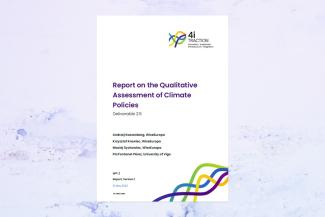
Kassenberg, A., Krawiec, K., Sychowiec, M., Pérez, P.F. (2023): Report on the qualitative assessment of climate policies. 4i-TRACTION Deliverable D2.5. WiseEuropa. Warsaw.
Report on the Qualitative Assessment of Climate Policies
This report presents the results of a qualitative ex-post evaluation of the EU's climate policy for the 2005-2020 period.
Through a review and evaluation of selected planning documents and legislation, a review of the literature, and interviews with experts involved in climate policy, this report, together with the quantitative assessment report, constitutes an integrated assessment of the EU climate policy for the period of 2005 - 2020.
A qualitative assessment of EU policy documents was made by evaluating the three objectives (3x20): Reducing greenhouse gas emissions by 20% in 2020 compared to 1990, achieving a 20% share of renewable energy in final energy consumption in 2020, and improving energy efficiency by 20% in 2020 compared to a reference scenario. The milestones that established the EU's climate policy were the Kyoto Protocol and the Paris Agreement. The study focuses on answering the question of which key transformative challenges have been addressed by policy documents at the EU level in the areas of innovation, investment, infrastructure, and integration.
In the area of innovation there was no significant emphasis on combining their development with the development of investment and infrastructure. We point out the inconsistency of this area with the environmental documents and the geographical disparities between Central and Southern Europe and Western and Northern Europe. In the area of infrastructure, we note that the assumption at the beginning of the analysis period (roughly until 2012) identified its development with the growth of the economic potential of individual regions and entire countries rather than with climate policy, which has become more intense over the years. In the area of finance, much more could have been done, as its role in financing sustainable investments grew over time - the closer we got to 2020, the bigger it became, but definitely not enough. In the area of investment, we point to the links between climate policy, broken down into the three cleats discussed earlier, and macroeconomic economic policy, transport policy, the impact on competitiveness, and issues such as health care, among others. Finally, the findings are discussed, setting out the conclusions for future policy making in the context of current multi-crises. Our intention is that, by learning from the mistakes of the past, the future political process related to shaping decisions of a strategic nature on the EU level will be more effective, taking into account the lessons learned for the benefit of the planet, its climate, and the citizens who inhabit it.